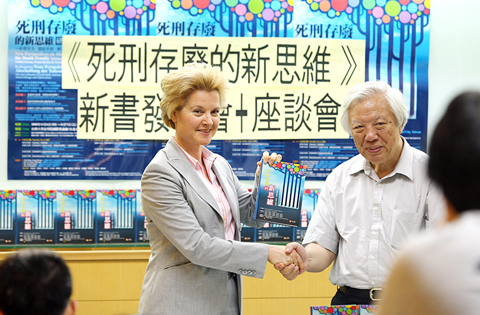Academics yesterday urged the government to review its policy on capital punishment by conducting an in-depth study on whether it discourages crime.
A panel discussion on the death penalty and its effect on crime rates was held yesterday as part of a book launch to promote "New Ideology beyond the Pros and Cons of the Death Penalty," a collection of essays from a seminar organized by the Taiwan Alliance to End the Death Penalty last November.
“We hope to initiate dialogue on the issue of the death penalty from a rational point of view,” said Birgitt Ory, director of the German Institute Taipei, which co-sponsored the publication of the book.

PHOTO: CNA
The institute aims to share Germany’s experiences following its abolition of the death penalty. It also hopes Taiwanese would find “living in a society without the death penalty is not only a possibility, but also a better choice,” Ory said.
The book contains essays by four German academics and detailed discussions among the four and 15 Taiwanese experts who participated in the conference on social security, prison reform, protection of victims and other issues.
“What is written on paper will be preserved,” Ory said. “We hope to provide thought-provoking ways of looking at the issue of the death penalty and inspire readers’ thinking on the subject.”
Panelists said that taking the life of a criminal was not necessarily the best way to compensate for the loss of the victim.
Experts urged President Ma Ying-jeou's (馬英九) administration to set a timeline for gradually abolishing the death penalty, instead of delaying it until the next president takes office.
Attorney Nigel Li (李念祖), who is also a board member of the Judicial Reform Foundation, said that since the legislature on March 31 ratified the Act Governing Execution of the International Covenant on Civil and Political Rights and the International Covenant on Economic, Social and Cultural Rights (公民與政治權利國際公約及經濟社會文化權利國際公約施行法), Taiwan should re-examine its law on the death penalty.
Since Taiwan has not executed a death row prisoner in more than four years, panelists urged the government to perform a statistical analysis on the crime rate to determine whether the abolishment of death penalty would have any effect on discouraging crime.

Taiwan is stepping up plans to create self-sufficient supply chains for combat drones and increase foreign orders from the US to counter China’s numerical superiority, a defense official said on Saturday. Commenting on condition of anonymity, the official said the nation’s armed forces are in agreement with US Admiral Samuel Paparo’s assessment that Taiwan’s military must be prepared to turn the nation’s waters into a “hellscape” for the Chinese People’s Liberation Army (PLA). Paparo, the commander of the US Indo-Pacific Command, reiterated the concept during a Congressional hearing in Washington on Wednesday. He first coined the term in a security conference last

Prosecutors today declined to say who was questioned regarding alleged forgery on petitions to recall Democratic Progressive Party (DPP) legislators, after Chinese-language media earlier reported that members of the Chinese Nationalist Party (KMT) Youth League were brought in for questioning. The Ministry of Justice Investigation Bureau confirmed that two people had been questioned, but did not disclose any further information about the ongoing investigation. KMT Youth League members Lee Hsiao-liang (李孝亮) and Liu Szu-yin (劉思吟) — who are leading the effort to recall DPP caucus chief executive Rosalia Wu (吳思瑤) and Legislator Wu Pei-yi (吳沛憶) — both posted on Facebook saying: “I

The Ministry of Economic Affairs has fined Taobao NT$1.2 million (US$36,912) for advertisements that exceed its approved business scope, requiring the Chinese e-commerce platform to make corrections in the first half of this year or its license may be revoked. Lawmakers have called for stricter enforcement of Chinese e-commerce platforms and measures to prevent China from laundering its goods through Taiwan in response to US President Donald Trump’s heavy tariffs on China. The Legislative Yuan’s Finance Committee met today to discuss policies to prevent China from dumping goods in Taiwan, inviting government agencies to report. Democratic Progressive Party Legislator Kuo Kuo-wen (郭國文) said

The Ministry of Economic Affairs has fined Taobao NT$1.2 million (US$36,900) for advertisements that exceeded its approved business scope and ordered the Chinese e-commerce platform to make corrections in the first half of this year or its license would be revoked. Lawmakers have called for stricter supervision of Chinese e-commerce platforms and more stringent measures to prevent China from laundering its goods through Taiwan as US President Donald Trump’s administration cracks down on origin laundering. The legislature’s Finance Committee yesterday met to discuss policies to prevent China from dumping goods in Taiwan, inviting government agencies to report on the matter. Democratic Progressive Party